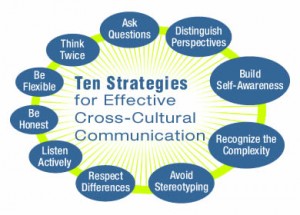In an increansingly competitive global market place being able to work effectively across cultures is more than a nice to have skill. It is now a key competency for all employees. To be aware of cross-cultural values, attitudes and behaviours that impact on the workplace, will allow you to communicate more efficiently and effectively across cultures.
Cross-cultural communication occurs when people from more han one culture communicate with eatch other. This communication is more difficult than communication among people of the same culture. Noise develops due to differences in languages, values and attitudes, among other factors. The major difference in how people communicate with each other are language usage, verbal style and non verbal communication.
These 3 factors mentioned above affect the communication process at 2 points:
When the sender encodes a thought, the choice of language, the verbal style used, and the nonverbals expressed carry a meaning that the sender expects the receiver to understand. If the sender encodes the thought in a manner that the receiver can comprehend, the sender enhances the accuracy of the communication.
When the receiver decodes and tries to understand the message, if he is familiar with the sender, he can decode the Language, verbal styles and non verbals and gain a better understanding of the message.
With many verbal and nonverbal differences in communication, people from different cultures oftenmisunderstand each other. People tend to interpret the words and actions of those from other cultures just as they would those of individuals from their home culture. This is a major barrier, even after studying an unfamiliar culture in advance. We also need to consider variations in culture, perception and experience.
For example culture becomes a barrier when people from two diferent cultures have different ways of reacting to the same situation. If a Canadian manager asks his subordinates in Canada for ideas about a particular task, the subordinates would probably understand this as a positive message. They would think the manager has an interest in their ideas. However if this manager asks the same question while on assignment in India, the understanding will be different. The subordinates would probably receive anegative message, believing the manager incompetent.
In addition to taking culture in consideration we have to acknowledge perceptions as well. Each of us has an individual perception of reality, a perceptual barrier is stereotyping. This process of stereotypingcan set up expectations that might be untrue. For example we have heard stereotypes about how other nationalities tend to work, some are rigid and hardworking, other are creative but less efficient etc. As soon as we meet someone from that nationality we apply that characteristics unconsciously. However, if a person can use a stereotype as an initial expectation of how someone might behave it can help. When you actually meet someone from other culture you will need to start gaining an understanding of the specific individual. Most internationally effective managers can change their stereotypes as they learn more about the real people they are working with.
Lastly but not least important is experience; when two individuals are from different cultures, it is likely their life experiences have varied in many ways. The type of home, how they worship, their educational System, what they eat…For example Canadian universities attach different numerical scales to grades given in courses than USA universities.
We can see how all these 3 barriers can interact in the following case:
An expatriate manager was on his first assignment in Africa. He realized that understanding the words in Burkina Faso was not enough, to be effective in that country, expatriates needed a good command of French and a respectable use of Moré, the principal African dialect. One day he was sitting on a large mat on the ground, meeting with a group of Mossi villagers. One man spoke in Moré and everyone nodded in agreement. Someone helped him by translating the word in French. However it turned out to be a parable, it was something like the “ the bird flew over”. The Mossi often uses parables, so the manager realized he needed to understand the cultural context not only individual words.
Working in an International context means not only speaking the language, taking in account their culture, perceptions and experience but also acquiring an awareness of your communication style and working preferences and how these impact counterparts in other countries.








Leave A Comment